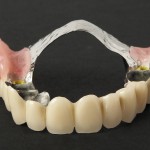
Tooth loss can have important physiologic and social impacts and a strong association has been shown between tooth loss and impaired oral health–related quality of life (OHRQoL). The aim of this review was to see whether oral rehabilitation following total or partial tooth loss had an impact on (OHRQoL).
PubMed, the Cochrane Central Registry of Controlled Trials, and Embase databases were searched together with the reference lists of included articles. Studies in adult over the age of 18 with at least 20 patients per group that reported Change in self-perceived quality of life (OHRQoL) estimated using validated and reliable scales were included. Quality of evidence was classified according to GRADE guidelines as high, moderate, low, or very low.
- 5 publications of high or moderate study quality were included.
- The results of these 5 studies showed positive effects of oral rehabilitation on OHRQoL.
- Two studies showed substantial improvements.
The authors concluded
This is a relatively new field of research; there are very few quantitative studies of how patients perceive OHRQoL following tooth loss and subsequent rehabilitation. While this review indicates that treatment has positive effects on quality of life, the scientific basis is insufficient to support general conclusions about the influence of various interventions on the OHRQoL of patients who have experienced total or partial tooth loss. To achieve a more comprehensive analysis, it is recommended that future studies be based on a combination of quantitative and qualitative methods, ie, questionnaires and semi-structured interviews. The follow-up period must also be appropriate for the specific intervention studied.
Comment
The authors note in their introduction the recent systematic review by Gerritsen et al 2010 which found a strong association between tooth loss and impaired OHRQoL. They also provide very detailed information about their search strategies. While the authors found many population based OHRQoL studies they highlight that this approach had seldom been used as outcome measures following interventions for tooth loss,. However, with an increasing move to patient reported outcomes this may change in the future, although the studies will need to be conducted with validated protocols to improve the quality of the available evidence.
Links
Hultin M, Davidson T, Gynther G, Helgesson G, Jemt T, Lekholm U, Nilner K,Nordenram G, Norlund A, Rohlin M, Sunnegardh-Gronberg K, Tranaeus S. Oral Rehabilitation of Tooth Loss: A Systematic Review of Quantitative Studies of OHRQoL. Int J Prosthodont. 2012 Nov-Dec;25(6):543-52. PubMed PMID: 23101034
Gerritsen AE, Allen PF, Witter DJ, Bronkhorst EM, Creugers NH. Tooth loss and oral health-related quality of life: a systematic review and meta-analysis. Health Qual Life Outcomes. 2010 Nov 5;8:126. Review. PubMed PMID: 21050499; PubMed Central PMCID: PMC2992503
